

Bitcoins. Crises financières. Démystifier la finance. Regarder Noire finance (1/2) en direct. Regarder Noire finance (2/2) en direct. Noire Finance. Finland Would Rather Exit Euro Than Pay for Others - Minister. Finland Would Rather Exit Euro Than Pay for Others - MinisterJuly 6, 2012 HELSINKI (AFP)--Finland would consider leaving the euro zone rather than paying the debts of other countries in the currency bloc, Finnish Finance Minister Jutta Urpilainen said in a newspaper interview Friday.
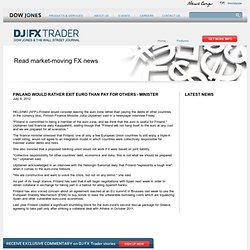
"Finland is committed to being a member of the euro zone, and we think that the euro is useful for Finland," Urpilainen told financial daily Kauppalehti, adding though that "Finland will not hang itself to the euro at any cost and we are prepared for all scenarios. " The finance minister stressed that Finland, one of only a few European Union countries to still enjoy a triple-A credit rating, would not agree to an integration model in which countries were collectively responsible for member states' debts and risks. She also insisted that a proposed banking union would not work if it were based on joint liability. "We are constructive and want to solve the crisis, but not on any terms," she said. Rubik ist kaputt ! ???? Basel Accords. The Basel Accords (see alternative spellings below) refer to the banking supervision Accords (recommendations on banking regulations)—Basel I, Basel II and Basel III—issued by the Basel Committee on Banking Supervision (BCBS).
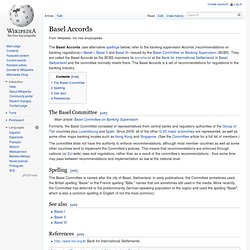
They are called the Basel Accords as the BCBS maintains its secretariat at the Bank for International Settlements in Basel, Switzerland and the committee normally meets there. The Basel Accords is a set of recommendations for regulations in the banking industry. The Basel Committee[edit] The committee does not have the authority to enforce recommendations, although most member countries as well as some other countries tend to implement the Committee's policies. Basel II. Basel II is the second of the Basel Accords, (now extended and effectively superseded[clarification needed] by Basel III), which are recommendations on banking laws and regulations issued by the Basel Committee on Banking Supervision.
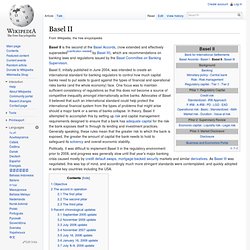
Basel II, initially published in June 2004, was intended to create an international standard for banking regulators to control how much capital banks need to put aside to guard against the types of financial and operational risks banks (and the whole economy) face. One focus was to maintain sufficient consistency of regulations so that this does not become a source of competitive inequality amongst internationally active banks. Advocates of Basel II believed that such an international standard could help protect the international financial system from the types of problems that might arise should a major bank or a series of banks collapse.
Objective[edit] The final version aims at: Basel III. General Overview[edit] Unlike Basel I and Basel II which are primarily related to the required level of bank loss reserves that must be held by banks for various classes of loans and other investments and assets that they have, Basel III is primarily related to the risks for the banks of a run on the bank by requiring differing levels of reserves for different forms of bank deposits and other borrowings.
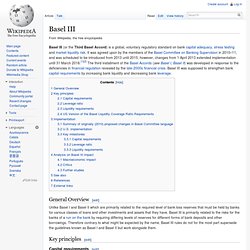
Basel 3. Moneyval En News. [26 septembre 2016] MONEYVAL's annual report: anti-terrorist financing measures not fully exploited yet Following the publication today of MONEYVAL's annual report, its Chair, Daniel Thelesklaf, pointed out that identifying the financing of terrorism has not yet been fully exploited as a strategy in the overall fight against terrorism.
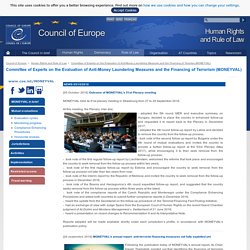
“We are struggling to find ways how to better combat terrorism. Money is needed to plan and perpetrate attacks. Detecting terrorist financing – even in small amounts – can help to detect terrorist cells, prevent terrorism and deter terrorists”, he said. In the report, MONEYVAL – which is the Council of Europe's anti money laundering and counter terrorist financing body - concludes that states have consistently improved their technical compliance with the international standards to fight money laundering and terrorist financing, particularly with regard to preventive measures.
Moneyval Fr Actualié 18/07/2012 = Banque du Vatican (IOER) [11 avril 2014] Résultats de la 44ème Réunion plénière de MONEYVAL MONEYVAL a tenu sa 44ème Réunion plénière à Strasbourg du 31 mars au 4 avril 2014.
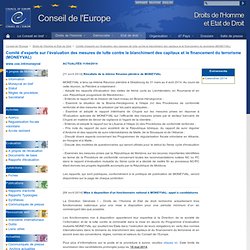
Www.coe.int/t/dghl/monitoring/moneyval/Evaluations/round4/MONEYVAL(2012)17_MER_HS_en.pdf. Qualified Intermediary (QI) - Accomodators & Intermediaries. The Role of Qualified Intermediary (QI) In A 1031 "Like Kind" Exchange Section 1031 of the Internal Revenue Code (IRC) offers a great opportunity for real estate buyers to defer the capital gains tax liability associated with the sale of a business or investment asset.
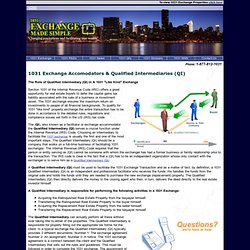
The 1031 exchange ensures the maximum return on investments to people of all financial backgrounds. To qualify for 1031 "like kind" property exchange the entire transaction has to be done in accordance to the detailed rules, regulations and compliance issues set forth in the US (IRS) tax code. The (QI), also known as a facilitator or exchange accommodator the Qualified Intermediary (QI) serves a crucial function under the Internal Revenue (IRS) Code. Choosing an Intermediary to facilitate the 1031 exchange is usually the first and one of the most important steps. A Qualified Intermediary is responsible for performing the following activities in a 1031 Exchange:
FATCA. Régulation bancaire / Crise financière. Règlementation prudentielle : Tier One, Ratio Cooke, etc. Vous êtes ici : Accueil > Guide Bourse > Règlementation prudentielle : Tier One, [...]
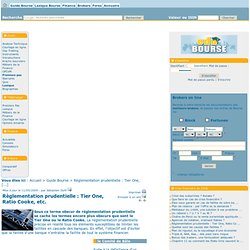
Sous ce terme obscur de règlementation prudentielle se cache les termes encore plus obscurs que sont le Tier One ou le Ratio Cooke. La règlementation prudentielle précise en réalité tous les éléments susceptibles de limiter les faillites en cascade des banques. Tier 1 capital. Tier 1 capital is the core measure of a bank's financial strength from a regulator's point of view.
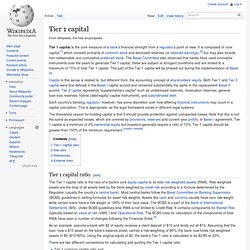
Tier 2 capital. Solvency II. The Solvency II Directive 2009/138/EC is an EU Directive that codifies and harmonises the EU insurance regulation.
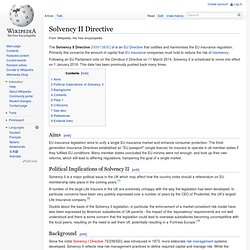
Primarily this concerns the amount of capital that EU insurance companies must hold to reduce the risk of insolvency. Following an EU Parliament vote on the Omnibus II Directive on 11 March 2014, Solvency II is scheduled to come into effect on 1 January 2016. This date has been previously pushed back many times. Aims[edit] EU insurance legislation aims to unify a single EU insurance market and enhance consumer protection.
Sarbanes–Oxley Act. The bill was enacted as a reaction to a number of major corporate and accounting scandals including those affecting Enron, Tyco International, Adelphia, Peregrine Systems and WorldCom. These scandals cost investors billions of dollars when the share prices of affected companies collapsed, and shook public confidence in the US securities markets. The act was approved by the House by a vote of 423 in favor, 3 opposed, and 8 abstaining and by the Senate with a vote of 99 in favor, 1 abstaining. President George W. Bush signed it into law, stating it included "the most far-reaching reforms of American business practices since the time of Franklin D.
Roosevelt. Surveillance des transferts bancaires européens par les autorités américaines : vers une remise en cause des garanties négociées ? UK banking commission. 2011/09 ICB-Final-Report. Le Royaume-Uni s'engage vers une réforme radicale de son système bancaire#mf_sid=407417610#mf_sid=407417610#mf_sid=407417610#mf_sid=407417610. C'est un document de 365 pages qui appelle à déclencher une petite révolution au pays de la City. Après quatorze mois de travail, la commission indépendante dirigée par l'économiste John Vickers a remis lundi 12 septembre un rapport attendu.
Commandé par le gouvernement britannique pour qu'un scénario de la crise financière de 2008 ne se reproduise pas, il recommande un changement radical du fonctionnement des banques. La principale mesure proposée est une séparation claire entre les activités traditionnelles de la banque de détail et les opérations d'investissement pour que les risques encourus avec ces dernières n'impactent pas les dépôts des particuliers.